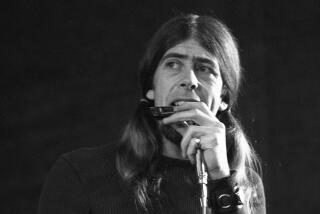Last Living Links to Delta Forge True Blues Festival Lineup
- Share via
When the blues were growing up in the Mississippi Delta, Saturday night was special for black farm workers.
Sunday was the Lord’s day; the plantations were quiet. Monday through Saturday, field hands toiled for 1920s wages that amounted to as little as a dime a day.
But the Delta country stores and juke joints had electricity to keep the refreshments cold, and every Saturday night, men and women went to shake off the dust of a week’s hard work. They drank, laughed, tossed a little dice and gathered around the guitar man, a flat picker who sat on the porch and sang about their lives.
In places such as this, music historians say, modern blues were born. Saturday at the Traditional Blues Picnic in Long Beach, Southland blues fans will get a rare chance to see venerable Delta musicians perform the blues as it was played in Mississippi more than six decades ago.
Appearing will be Honeyboy Edwards, who rambled across the South in 1937 and 1938 playing guitar with blues legend Robert Johnson; Roebuck (Pops) Staples, the gospel singer who learned his craft watching Charley Patton, a major blues figure who popularized Delta blues in the 1920s; and Sunnyland Slim, the 86-year-old pianist from Mississippi who helped introduce the blues boogie shuffle.
Also playing will be harpist Snooky Pryor, guitarist Jessie Mae Hemphill, guitarist Eugene Powell and the Bud Spires/Jack Owens duo.
“These people are living legends,” said John Ruskey, curator of the Delta Blues Museum in Clarksdale, Miss. “We’re talking about direct musical descendants who were around when the blues first got started. A festival of this kind occurs pretty infrequently, even around here.”
Sponsored by KLON-FM 88.1, the daylong show will be held outdoors at the Rainbow Lagoon park. The event folds into the Delta music theme at this year’s Long Beach Blues Festival, which is featuring a tribute to Muddy Waters on Sept. 18 and 19.
“This is something I’ve wanted to do for quite a while,” said Ken Poston, producer of the Long Beach Blues Festival. “It’s a real rarity enough to see these performers individually, but all together. . . . I’m very excited. These are the last living links to the beginning of Delta blues.”
In 1930, Pop Staples was a boy living on Dockery’s farm and cotton gin mill, a Cleveland, Miss., plantation that was home to many early bluesmen.
There, Staples first saw Charley Patton, who was the main influence to the next generation of young bluesmen--players such as Robert Johnson, Son House, Howlin’ Wolf and Muddy Waters, who carried the blues out of the Delta to Chicago and across the country.
“When I got old enough, I got to go on Saturday evenings to a place we called the Big House,” Staples said during a recent telephone interview. “That was a store with a big patio that was raised up like a stage. People were there having fun, eating fish and drinking beer. And it was a great, pleasant life.
“On that porch, I saw Charley Patton, sitting back on a wood chair, playing this guitar,” he said. “I thought he was the greatest. He played a sound I heard inside me, and I liked it.”
Several years later, Staples was also greatly inspired by a young Howlin’ Wolf, who come into town.
“He played tough, putting his guitar behind his head and not missing a note. He was moving and shaking, and he put on a show.”
Though Staples became well-known for his gospel music, “it all came from the blues. Nearly everything I got in me comes from the blues.”
Today, Staples is amazed by the resurgence of the blues, gospel and other forms of black music.
“I gave a show that I do every year in Mississippi that got 5,000 people this year,” he said. “When I started it, I got maybe 500 people. I fill up Mississippi now like Frank Sinatra fills up Los Angeles.
“A lot of us that helped start the blues are getting real appreciated now,” Staples said. “Sometimes I think, ‘Lord, have mercy, how’d I ever get here?’ ”
More to Read
The biggest entertainment stories
Get our big stories about Hollywood, film, television, music, arts, culture and more right in your inbox as soon as they publish.
You may occasionally receive promotional content from the Los Angeles Times.










